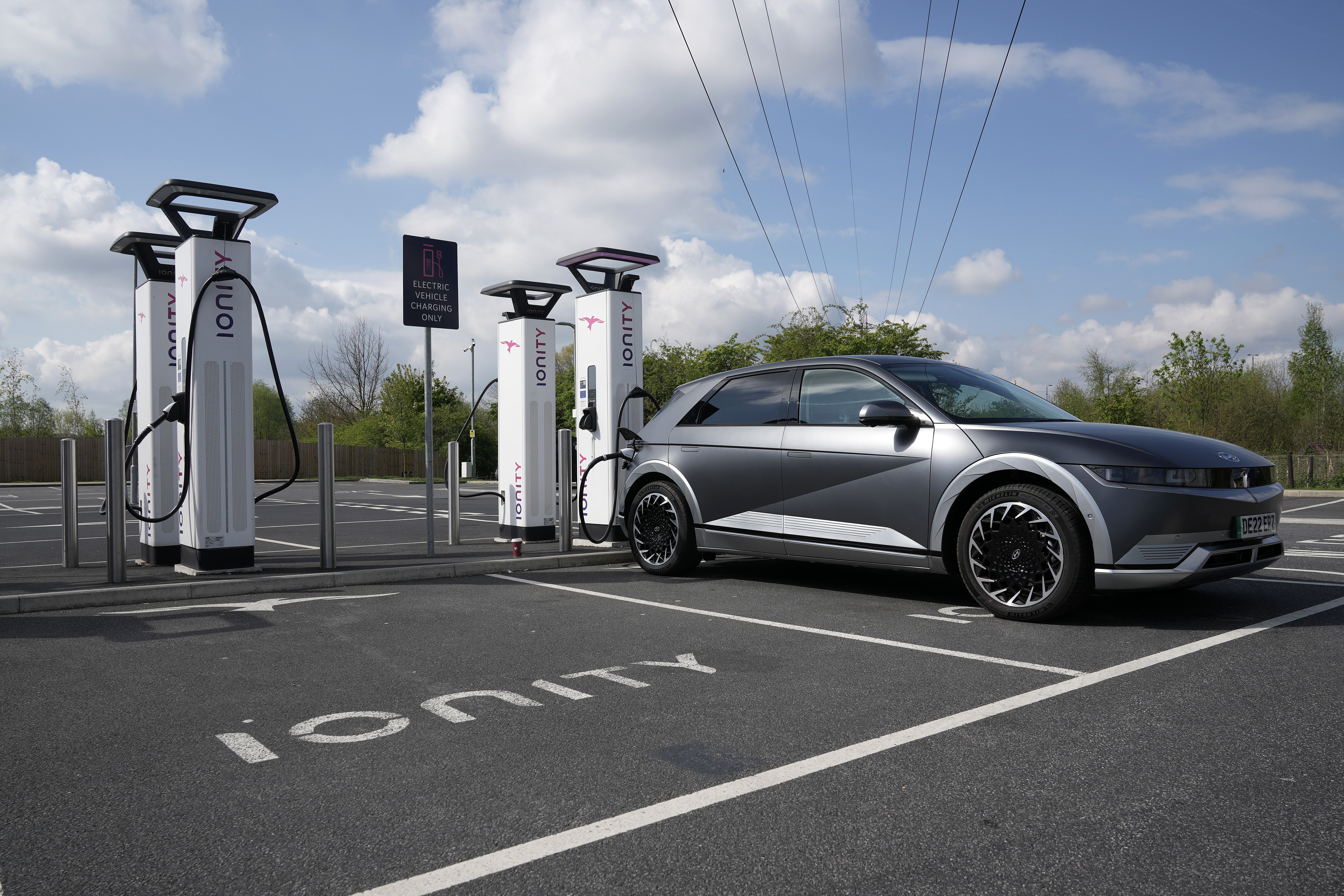Electric cars may be good for the planet but they are terrible for your nerves
With new figures showing more electric cars are being sold than ever but that only two out of five petrol stations have met the targets for rapid charging points, Eleanor Mills, who has had an EV for three years, is getting frustrated that progress seems to be going backwards – and that a nippy two-hour journey can sometimes take seven hours


So how was Christmas for you? Have you spent a large chunk of the last 10 days trying to get from one relative to another across the UK’s increasingly unreliable and congested road network? Were you stuck in a never-ending traffic jam on the M25, or M5, or M40 or M6 or M42 (select as appropriate)? It doesn’t matter where you try and drive, it’s always the same crawling-along drill, GoogleMaps intoning: “There is a 20-minute delay, you are on the fastest route”. But while we all share this pain, there is a special circle of hell reserved for those of us doing festive visits in an electric car.
The news this morning that the government has massively missed its target for installing charge points for electric vehicles at motorway service stations – there are meant to be at least six in all of them but the RAC reckons only two in five services have them in place – was greeted in my house with a massive groan. It is not news to us, or any UK EV driver, that the charging infrastructure is woefully inadequate. We all have the scars to prove it. Take my friend who was driving to Scotland in his Tesla, he got to the Wirral to find all the Tesla charging points taken or broken, with the nearest ones at Preston. He limped there to discover three other drivers already waiting and not wanting to wait three hours just to get on a charger, got a lift from a friend and abandoned his car for the weekend.
Or take my Christmas visit to my mother-in-law in Bromsgrove. She’s getting on and doesn’t walk so well, so we drive up to her sheltered housing and take her out for lunch. That used to be fine. In our old BMW X3, we’d nip up there from London in just over a couple of hours, the same back. Not any more. Our beloved electric Nissan Leaf (bought three years ago) has a range of just over 100 miles (less if we have the heating on or it is a cold day when electric cars consume more energy). That means to get to Bromsgrove we have to stop and charge for at least 45 minutes both on the way there and the way back. Turning a two-and-a-half-hour trip into a three-and-a-half-hour trip (if we’re lucky).
The problem is that because of the scarcity of chargers, even on Britain’s major motorways, there is never a guarantee that when you do stop to charge you will be able to get on a charger. Like the time we set off at 7am – and made it to Cherwell Valley Services by 8.30am. Only to find that this spanking new electric hub (one of the flagship ultra-fast charging points that the government has invested £70m in and wants to replicate) was chockablock. Yes, there were 10 or so fast chargers, but every single one was full (except for two which were broken). We waited patiently but it was over half an hour before we managed to start charging – which then took an hour (another driver cut off our charge and didn’t tell us). So we added nearly an hour and a half to a two-and-a-half-hour journey. And that is stopping somewhere that has a plethora of chargers.

The usual reality is distinctly worse. Given that for the last few years, the government and the automotive industry have been pushing us all to go electric (20 per cent of all new car sales were electric in August 2023, by 2032 the government has pledged to phase out all light duty combustion engines, with a ban on any fossil fuel engines by 2050) an EV driver might expect that it would be possible to charge on UK motorways. Ha! Is all I can say to that. Plus, the likes of Tesla delivered a staggering 1.81 million EVs in 2023 and built 1.85 million. The company also made nearly 500,000 cars in the fourth quarter alone at its factories in California, Texas, Germany, and China, and delivered 484,507 worldwide.
However, despite these figures, at most of the service stations on the M4, there are one or two electric chargers for thousands of cars, while at some services on the M1, M6 and A1(M) there are still no electric chargers of any kind. This isn’t an isolated incident, the RAC reports that of 119 service station sites, only 46 have the six minimum chargers the government promised by December 2023.
What does that mean in practice? Well, the last time we stopped at Leigh Delamere services, a huge hub north of Bristol on the M4, three electric cars were waiting to charge ahead of us and only two chargers. We were stuck there for more than two hours and we were lucky because our EV is so old it uses the Betamax version of EV chargers, called Chademo, which most cars now don’t use, so we had a shorter wait. I felt incredibly sorry for a poor woman in an electric Jaguar next to us, who needed a CCS charger, and had two crying toddlers, an empty battery and was facing at least an hour’s wait before she could even begin to charge. She’d been to see her in-laws in Bath and was trying to get back to London, it was freezing cold, the kids were tired and she couldn’t go anywhere until she’d charged. I gave her a hug.
There is good solidarity among most EV drivers with the odd bolshy exception. The charging situation is particularly galling to us because it feels like we are being penalised for doing the right thing. I bought my electric car because I’m terrified about climate change and what the planet will look like for my children. By driving a zero-emission car – which is still £15k or so more expensive than a petrol model – we are trying to do our bit to cut energy consumption. But it’s not exactly progress when journey times double – sometimes we joke that going in a horse-drawn cart, or walking, would be quicker.
“The essential problem is that motorway service stations are often built in remote areas without sufficient capacity from the national grid to install multiple electric chargers which require huge amounts of energy,” explains Patrick Sherriff, an EV consultant. “There is a massive infrastructure investment and work required to upgrade the grid and the government is not doing enough quickly enough to meet the need. Even getting to the government target of six rapid EV chargers per service station, which is miles off, isn’t going to fix the problem, if you think each pump can charge about 15 cars a day and there are thousands of EV cars. Six chargers won’t touch the sides.”
Other experts say that one huge blocker to progress is the monopoly enjoyed by Gridserve until 2026, which runs the majority of motorway EV charging stations; it has no incentive in terms of competition to keep on its toes and hasten provision. The view within the industry is that nothing will improve until that monopoly is broken up. “What we need is hundreds of rapid chargers at motorway service stations, great banks of them. That is where we are headed with major firms investing but this is unlikely to be a reality until at least 2030,” agrees Sherriff.

So what do those of us who need to travel distances longer than our existing range do in the meantime? Be patient apparently. Or in my case, with a daughter at Manchester University (which would necessitate at least two 45-minute charge stops in each direction, making a journey of four hours, take about seven even if we could charge immediately), I’ve resorted to borrowing my brother’s petrol estate to get her up there and back with her stuff. Which is not exactly a reason to buy an electric car!
It all makes me furious because I love my Nissan Leaf. It is quiet and nippy and the acceleration is a revelation, I can take off from a traffic light faster than a Porsche or a motorbike. There are huge advantages, particularly since we live in the Ulez zone in central London (where just to keep my old BMW on the street would cost us £12.50 a day). We pay zero congestion charge and can park all day in Westminster by paying for 10 minutes. It’s easy to charge the Leaf overnight on an EV charging lamp post outside my house and if we go to stay with family or friends we can plug it into their domestic supply (yes, we pay them for the electricity). So it’s great until it’s not. Which is usually when you have to travel more than 100 miles.
It makes me furious that the government is incentivising people to go electric – part of the reason Britain is the first G20 country to halve its carbon emissions – but is still not investing in the core infrastructure, which means EV drivers can confidently get to their destinations when they need to. I was asked the other day if I regret buying my Leaf – the answer is “sometimes”. I certainly wouldn’t have one if I had young children or had to drive distances of more than 100 miles with any regularity.
So come on Rishi – it’s time. Time to invest in the infrastructure needed and back those of us trying to do the right thing for the planet and the future. When I bought my car three years ago I thought by now it would be rapid chargers a-go-go on the motorways. But the reality is it’s getting worse. Help us! Please!





Join our commenting forum
Join thought-provoking conversations, follow other Independent readers and see their replies
56Comments